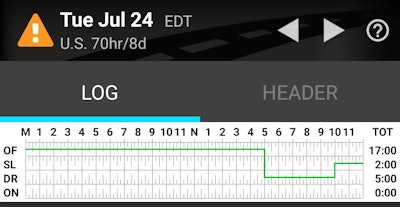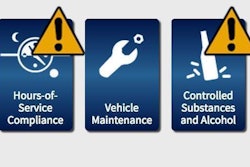
It appears likely that the Federal Motor Carrier Safety Administration will miss its projected June 7 date for unveiling its proposal for overhauling hours of service regulations and opening the proposal up for public comments. With just two days remaining until that date, the White House’s Office of Management and Budget has yet to stamp its approval on the proposal, which it must do before FMCSA publishes the document.
Of course, OMB could approve the rule today or Thursday and FMCSA rush to publish the notice of proposed rulemaking, but such documents usually take several days, if not longer, to be published after OMB approval.
In the meantime, the agency could issue its monthly June regulatory report, which will shed more light on when the hours proposal might be published.
Also in the meantime, and perhaps more pressing, Congress could stick its nose into the hours overhaul process. Tucked into a budget bill that cleared the House’s Appropriations Committee on Tuesday is a provision that would, in effect, protect the 30-minute break within current hours regs. The bill, a Transportation, Housing and Urban Development (THUD) appropriations bill for the 2020 fiscal year, would prohibit FMCSA from “eliminating the 30-minute break,” to use the language within the bill itself.

As reported by Overdrive last month, the bill could set up a clash between lawmakers and regulators at FMCSA. It’s still unknown whether FMCSA’s hours proposal will attempt to remove or alter the 30-minute break requirement, but it was a key topic of consideration in last year’s public debate on hours regs.
However, two elements that could work in favor of nixing or changing the 30-minute break:
(1) The THUD bill will expire next September, meaning the provision on the 30-minute break would expire then, too. It’s unlikely FMCSA could move swiftly enough on issuing or enacting a final rule to reform hours of service regs by that date, so the provision within the THUD bill could be inconsequential. Lawmakers would need to renew the provision to uphold the 30-minute break for the 2021 fiscal year, should FMCSA try to eliminate the break requirement.
(2) The 30-minute break provision must still pass the full House intact and the Senate, and then likely a conference committee between the two chambers should their THUD bills differ. That’s a steep hill to climb for a provision that’s likely to be publicly challenged by industry groups and, likely, lawmakers from both parties.
Correcting the record on 34-hour restart regs
Congress in December 2014 suspended regulations implemented just 18 months prior, in July 2013, that limited the use of drivers’ 34-hour restart to once a week and that required the restart to include two 1 a.m. to 5 a.m. periods.
Strong pushback from the industry on those limits led to Congressional action, and the regs never saw the light of day again, with a mandated field study showing that the regs had no impact on operators’ safety.
In March of 2017, after that report was handed to Congress and FMCSA updated its website to reflect that the 34-hour restart limits would indeed not go back into effect, I penned a headline stating “FMCSA puts the final nail in the coffin for 34-hour restart regs“.
It turns out, however, that headline may have been false. I jumped the gun by about two and a half years, it seems: FMCSA now has a rule in the works to permanently bury the regulations via the formal rulemaking process, rather than simply an update to its website.
The rule is slated to be published in December, according to a regulatory report issued twice a year by the OMB, to remove the 2013-enacted restart provisions from the Code of Federal Regulations. “The provisions remain in the CFR but are not enforced, possibly causing confusion for stakeholders,” says a summary of the rulemaking.
When that date comes, then FMCSA will have indeed put the final nail in the coffin of those 34-hour restart regulations.









